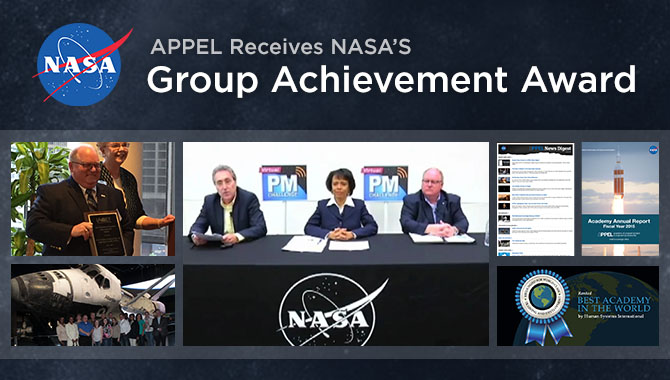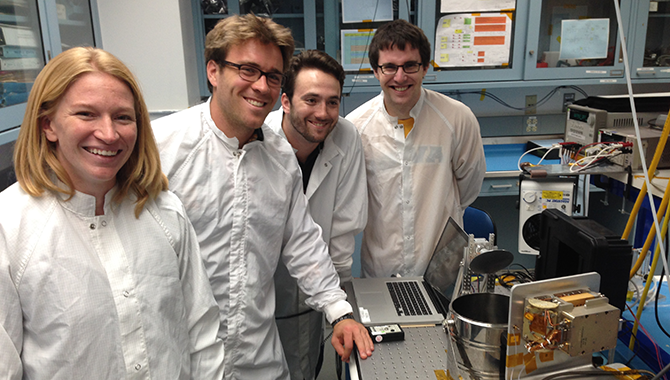
Every day, the APPEL team strives to support mission success at NASA by promoting learning for the technical workforce. Recently, the agency recognized the team for their efforts.
As NASA’s primary internal resource for program/project management (PM) and systems engineering (SE) development, APPEL has one overarching goal: to help ensure that the agency’s PM and SE communities have the skills and knowledge they need to advance mission success. The team behind APPEL prides itself on doing its work as seamlessly and unobtrusively as possible. Their efforts have not gone unnoticed, a fact that was highlighted this summer when the team received NASA’s Group Achievement Award. APPEL News caught up with APPEL Director Roger Forsgren to find out why he believes the team was singled out for the work it does on behalf of the agency’s technical workforce.
APPEL News: Congratulations on receiving the NASA Group Achievement Award. For those of us who aren’t familiar with it, can you tell us what the award signifies?
Roger Forsgren: The Group Achievement Award is an agency honor award. It recognizes an outstanding group accomplishment that has contributed substantially to NASA’s mission. Specifically, the APPEL team received it for providing world-class training to help ensure agency project managers and system engineers have the skills and knowledge needed to advance mission success.
One of the things that excites me about receiving this award is that it’s for group achievement—which is what APPEL is all about. Helping individuals and groups at the agency, such as project teams, succeed at their missions is what APPEL is tasked with doing. So I feel like receiving the Group Achievement Award validates what we do as well as how we do it.
APPEL News: Why do you believe the APPEL team deserves this award?
Forsgren: Simply put, our team works hard and produces great results. We’ve leveraged the creativity, dedication, and passion for excellence of every person on the team to raise NASA’s PM and SE training to a world-class level. Based on post-course surveys, we know that our efforts meet the needs of our stakeholders. For instance, in fiscal year (FY) 2015, the rating for Overall Customer Satisfaction with APPEL courses was 4.8 out of 5.0. We’ve also been recognized by external organizations for the effectiveness of our training and development initiatives. Just this past year, APPEL earned the prestigious honor of being named the “best academy in the world” by Human Systems International, which is part of the Project Management Institute. And the International Association for Continuing Education and Training (IACET) presented APPEL with its Exemplar Award for significant contributions to the field of continuing education and training.
Together with APPEL Deputy Director Steve Angelillo, we lead a diverse group of contractors from several different companies who work as a fully integrated team. For all of us, the focus is always on the technical workforce and what we can do to help them do their jobs effectively in order to advance mission success. I don’t think it hurts that we all love what we do, too.
APPEL News: In what ways does APPEL support mission success at NASA?
Forsgren: Advancing mission success is really at the heart of what APPEL does and the reason for our existence, so everything we do is to achieve that end. We accomplish this in a number of ways, ranging from delivering courses to thousands of participants each year to supporting hands-on training for agency young professionals to offering innovative web resources that support practitioner development.
APPEL News: You said APPEL exists to advance mission success…
Forsgren: That’s right. APPEL training courses and resources are designed to address the wide variety of dimensions involved with complex projects. APPEL grew out of a need, which emerged after the Space Shuttle Challenger tragedy in 1986, to strengthen the development of our talent—our technical workforce—across the agency.
The first incarnation of APPEL was called the Program and Project Management Initiative (PPMI), which was introduced in 1989. PPMI focused on building individual competencies to support PM excellence through a series of training courses that taught the fundamentals of PM knowledge. PPMI was an excellent start, but as the agency’s portfolio of programs and projects grew, we had to keep pace and provide additional technical training.
In 1998, APPEL—the Academy of Program/Project & Engineering Leadership—emerged out of those broader needs as an agency-wide resource for technical workforce training and development. Since then, it has continued to evolve as agency needs and mission have evolved. For example, in 2004 the Academy moved to the Office of the Chief Engineer, and a year later APPEL began helping NASA build its SE capability to support the Constellation era. Although Constellation is behind us now, strengthening SE as well as PM capability remains critical to NASA’s success. So as the organization changes, APPEL changes with it to reinforce its capabilities.
APPEL News: How does APPEL ensure its offerings remain relevant to today’s workforce?
Forsgren: APPEL has always worked closely with a variety of internal subject matter experts to ensure that critical lessons learned are infused throughout our curriculum. In addition, we collaborate with center representatives and their management to ensure the courses they select support center and mission initiatives. Our customers are also our stakeholders, so we listen closely to their needs and suggestions.
APPEL also aligns our programs with the four-level New World Kirkpatrick Training Evaluation Model, a global standard for evaluating the effectiveness of training. APPEL has always gathered metrics at Levels 1 and 2 in our courses, and we are now initiating Level 3 in relevant courses. This will allow us to ascertain how participants in APPEL courses apply what they’ve learned during the training once they’re back on the job. Getting to a Kirkpatrick Level 3 will put APPEL in an exclusive status among PM providers throughout the world. For comprehensive developments programs, such as the Systems Engineering Leadership Development Program (SELDP), APPEL is pursuing Level 4, which looks at the overall results in terms of what these training initiatives deliver to key business stakeholders and the degree to which their expectations have been satisfied.
APPEL News: In addition to classroom trainings, what other resources does APPEL offer to support development?
Forsgren: We align our offerings with agency needs by linking training opportunities directly to the PM and SE competencies NASA considers critical to project success. To facilitate this, the APPEL website houses the interactive PM&SE Competency Model, which helps practitioners clearly define competencies and points them toward the appropriate coursework to enhance competency-related skills. We also provide the interactive PM&SE Career Development Framework, which helps practitioners understand the competencies related to their work and the courses and resources that will support their development. Practitioners and their supervisors or managers can use both of these tools to chart a clear path for professional development.
In addition to these resources, we try to make it simpler for practitioners to select the right course for their purposes. For instance, a while ago we introduced the first interactive APPEL Catalog, which features enhanced course descriptions with short video introductions so prospective students can sample each offering. More recently, the team streamlined processes by offering one-click registration through the APPEL Catalog and adopting a convenient quarterly registration model.
The APPEL team offers NASA employees fast and easy access to a wide variety of information and tools on the APPEL website. One way we convey information to a wide audience is through our monthly digital publication APPEL News Digest, which reaches over 75,000 subscribers worldwide. APPEL also produces the NASA Virtual PM Challenge, an online dialogue series focused on critical aspects of project management. We have a robust case-study collection on the APPEL website, which augments agency lessons-learned efforts, along with ongoing informative, PM-related articles and archived materials that allow us to share valuable knowledge with NASA’s technical workforce as well as with universities and other institutions.
In addition to offering training solutions to individuals across the agency, the APPEL curriculum is a component of many of the NASA centers’ proprietary development programs. Furthermore, APPEL supports the agency’s young professionals with a combination of classroom and hands-on learning, through initiatives such as Project HOPE and Rocket University. We are also involved with the SELDP, which is kicking off a new training opportunity this summer.
APPEL News: Is this emphasis on PM training unique to NASA, or do other government agencies have a similar need? If so, how can they benefit from APPEL’s decades-long experience?
Forsgren: I’d say PM training is a hot topic, and a significant need, for all government agencies. There’s currently a bill in Congress, S1550, the Project Management Improvement Accountability Act. It was created to improve program and project management in the federal government. Essentially, it requires every federal agency, outside of the Department of Defense, to have a PM training and improvement program along with a senior executive who oversees this, with the goal of ensuring PM is incorporated into all training and PM training is available to all employees. So it’s not just NASA that is concerned with PM training, it’s the whole government. That said, NASA has been leading the way since 1989, and the positive results stemming from APPEL’s efforts suggest we’ve set a standard that others might benefit from examining. APPEL regularly benchmarks with other companies, including federal agencies, to share approaches and lessons learned.
APPEL News: If you could point to just one thing, what would you say has been the key to APPEL’s success over the years?
Forsgren: It really comes down to the incredible support that APPEL receives from upper management. While we do everything we can at APPEL to support the agency’s technical workforce, we don’t do it alone. The strength of our training and development offerings directly reflects the support APPEL gets from NASA management. Moreover, as I mentioned, we work closely with our stakeholders, with individuals and groups at each center, with subject knowledge experts—including the NASA Chief Knowledge Office (CKO)—and with other communities and organizations across the agency. The dedication of everyone involved makes it possible to deliver world-class training that consistently supports mission objectives.
One neat thing about engineers is that they love learning. It’s a real honor for the entire APPEL team to help them reach their goals.









